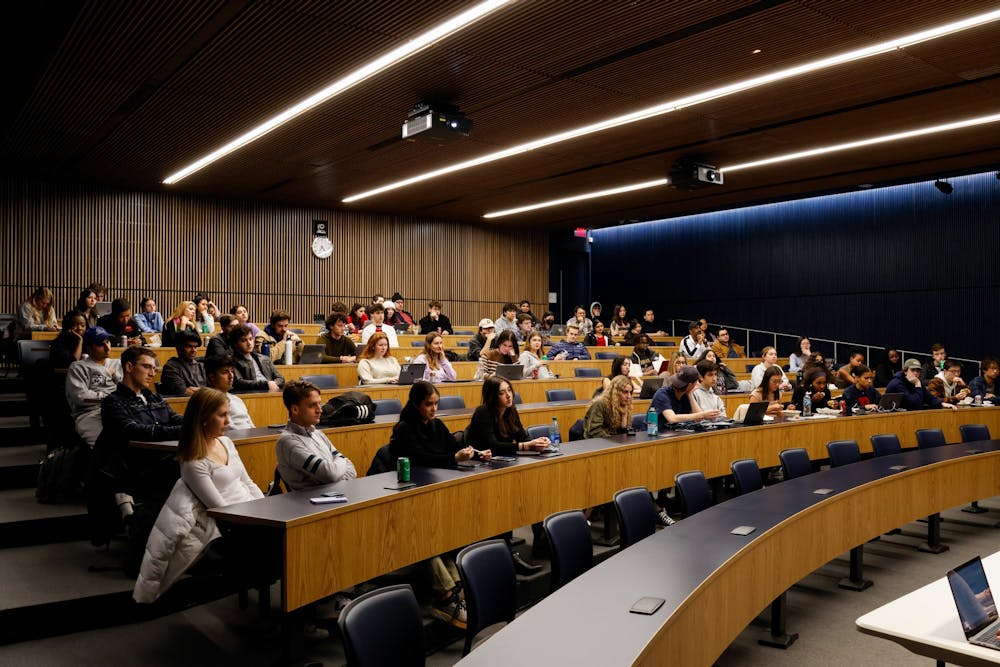
Three Penn student political groups participated in a debate on March 20 hosted by the Penn Government and Politics Association.
Several panelists representing Penn Democrats, Penn College Republicans, and Penn for Liberty faced off for over an hour in front of approximately 80 Penn community members. The event was co-hosted by The Andrea Mitchell Center for the Study of Democracy.
In the debate, which was moderated by Penn GPA president and College junior Marc Edayadi, panelists discussed political issues such as crime and criminal justice, affirmative action, environmental justice, and minimum wage policies.
Penn Young Democratic Socialists of America was also invited to the event but withdrew beforehand. Before the debate started, Edayadi explained YDSA’s absence from the debate and shared a statement from the group about the RAs' recent unionization effort.
“YDSA wanted to mention the union campaign of Penn RAs and wants to remind all to stand in solidarity with their organizing,” Edayadi said.
Edayadi first asked the groups about their views on how the government should address crime while simultaneously balancing the various racial disparities within the criminal justice system.
All of the groups agreed that crime and the criminal justice system are important issues, but their opinions varied on the correct way to address this issue.
Penn Dems spoke about the importance of addressing other issues that can lead to the disparities within the criminal justice system, such as affordable housing.
College Republicans spoke on the importance of maintaining Second Amendment liberties while also highlighting red flag laws, which prevent individuals potentially at risk of harming themselves or others from obtaining guns.
College Republicans panelist and College sophomore Maya El-Sharif argued for “more police training, not less” in order to combat crime.
All of the groups agreed on the need for sentencing reform within the criminal justice system. College sophomore Julian Trahanas, representing Penn for Liberty, spoke about the harm of lengthy prison sentences.
Penn Dems agreed, also noting the racial disparities within the system.
After an audience question about short-term rather than long-term solutions to address crime, Penn Dems said that funding education is important as a deterrent for crime, but the group was met with pushback from other panelists over whether that is a short-term solution or a long-term idea.
The next section of the debate focused on affirmative action policies and diversity within the college admissions process.
College Republicans argued that policies should also focus on the importance of diversity of experience, rather than just race.
“Affirmative action has become a buzz term in the media — checking a box flattens what it means to be a minority within America. I don’t think checking a box saying I’m white explains my experience as a Middle Eastern within America,” El-Sharif said.
In response, Penn Dems argued about the importance of affirmative action policies in overcoming systemic barriers for minority applicants.
“If we lived in a world without discrimination and bigotry, then we wouldn’t have to look at race,” Penn Dems membership director and College sophomore Christina Salas, a former DP reporter, said.

Shifting the conversation to the workforce, Trahanas explained his opinion that there should not be affirmative action policies within the employment realm.
“Let businesses and people form their own interests and their own employment policies to their own detriment or success,” Trahanas said.
Later on, Edayadi asked panelists about their views on environmental regulation and the government’s role in preventing disasters and protecting citizens.
Penn for Liberty panelist and College senior Philip Steinkrauss acknowledged the importance of environmental justice but argued that it should not interfere with America’s capitalist economy.
“We believe in capitalism, and environmental regulations are no exception [to that belief],” Steinkrauss said in the debate.
College Republicans vice president and College and Wharton sophomore Joshua Frazier spoke on the importance of “incentivizing companies” to be prepared for the eventual change from fossil fuels, while Penn Dems argued that governments should have a role in “regulating environmental standards.”
The final question of the debate focused on each group's opinion on the minimum wage and the government’s role in labor policies.
College Republicans expressed uncertainty about whether the federal government increasing the minimum wage would be beneficial, citing the potential job losses and impediments to small businesses throughout the country.
Throughout this section of the debate, all of the organizations argued whether or not raising the federal minimum wage to $15 per hour would be the correct solution.
After an audience question about raising the minimum wage in consideration of inflation, El-Sharif responded, “15 is an arbitrary number.”
Penn Dems supported raising the minimum wage to $15 an hour and expressed additional support for unions.
Steinkrauss ended this section of the debate by explaining why he believes the federal government should not impose a minimum wage.
“If there’s one thing you take away from this section of the debate, minimum wage prevents prospective employers and employees from making a mutually beneficial working contract,” Steinkrauss said.
Edayadi concluded the debate by thanking the audience for attending and listening to the various groups’ perspectives.
“We want to encourage more dialogue on campus through inter-political debate and bring more people together from different political ideologies,” Edayadi told The Daily Pennsylvanian after the event.
The Daily Pennsylvanian is an independent, student-run newspaper. Please consider making a donation to support the coverage that shapes the University. Your generosity ensures a future of strong journalism at Penn.
Donate



